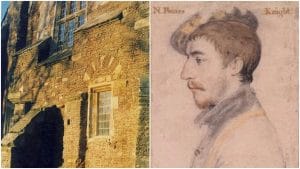 On this day in history, 23rd August 1535*, royal favourite and keen reformer Sir Nicholas Poyntz welcomed King Henry VIII and his second wife, Anne Boleyn, to his home Acton Court in Iron Acton, South Gloucestershire, as part of the couple’s royal progress.
On this day in history, 23rd August 1535*, royal favourite and keen reformer Sir Nicholas Poyntz welcomed King Henry VIII and his second wife, Anne Boleyn, to his home Acton Court in Iron Acton, South Gloucestershire, as part of the couple’s royal progress.
Sir Nicholas Poyntz was born around 1510 and was the eldest son of naval commander Sir Anthony Poyntz and his first wife, Elizabeth Huddesfield, and grandson of Sir Robert Poyntz, vice-chamberlain and chancellor to Catherine of Aragon, Henry VIII’s first wife. The Poyntz family were an old Gloucestershire family, dating back over 200 years in the county. In 1527, Poyntz married Joan Berkeley, daughter of Thomas Berkeley, 5th Baron Berkeley. Poyntz was a favourite of both Henry VIII and Anne Boleyn. In the autumn of 1532, he accompanied the king and Anne, who had recently been made Marquis of Pembroke and who was not yet married to the king, to Calais. The aim of this trip was to meet with Francis I of France and to get his support for their marriage.
Although Poyntz’s wife came from a staunchly Catholic family, Poynt was a zealous Reformer. His Oxford Dictionay of National Biography biographer, Alasdair Hawkyard, writes of how he was “brought up in the reformist zeal shared by so many of his closest relatives” and that “he displayed his contempt for traditional religious observances by incorporating in several of his properties, including Ozleworth, Gloucestershire, stones from smashed crosses from churches.”
Acton Court had been in the Poyntz family since 1364. Sir Nicholas Poyntz added an entirely new east wing to the property, in preparation for the king and queen’s visit. It was built in just nine months and was a rush job; it didn’t even have proper foundations. As I said in my article a few days ago, Poyntz modelled the rooms on Hampton Court Palace and Whitehall Palace and furnished them with the latest in luxury items. He was all out to impress and it is said that his reward for his hospitality was a knighthood during the royal couple’s stay.
Notes and Sources
* The proposed itinerary in Letters and Papers gives 21st August as the scheduled date for the royal couple’s visit to Acton Court, which is why I’ve written about it as happening on that date before, but Natalie Grueninger and Sarah Morris state that the progress was delayed slightly so the royal couple stayed there on 23rd and 24th August.
- POYNTZ, Sir Nicholas (by 1510-56), of Iron Acton, Glos. of London.
Published in The History of Parliament: the House of Commons 1509-1558, ed. S.T. Bindoff, 1982. This entry can be read online at http://www.historyofparliamentonline.org/volume/1509-1558/member/poyntz-sir-nicholas-1510-56 - Hawkyard, Alasdair. “Poyntz, Sir Robert (b. late 1440s, d. 1520).” (includes Sir Nicholas Poyntz) in Oxford Dictionary of National Biography, edited by H. C. G. Matthew and Brian Harrison. Oxford: OUP, 2004. Online ed., edited by David Cannadine, September 2015. http://www.oxforddnb.com/view/article/70796 (accessed August 19, 2016).
- Morris, Sarah and Grueninger, Natalie (2013) In the Footsteps of Anne Boleyn, Amberley, p. 176-270.
- Acton Court website – http://www.actoncourt.com/
- Acton Court, Henry VIII and Anne Boleyn – The Royal Progress of 1535 by Nasim Tadghighi